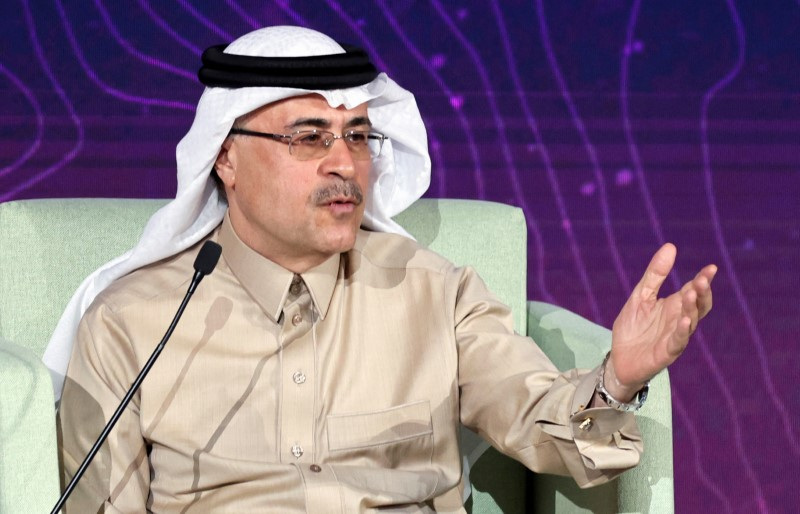By Maha El Dahan and Dmitry Zhdannikov
DAVOS, Switzerland (Reuters) - Global oil markets will cope with Red Sea disruptions in the short run, although prolonged attacks by the Houthis on ships would lead to a shortage of tankers due to longer voyages and a supply delay, the CEO of Saudi oil giant Aramco (TADAWUL:2222) said.
Amin Nasser told Reuters he expected the oil market to tighten after consumers depleted stocks by 400 million barrels in the last two years, which left OPEC's spare capacity as the main source of additional supply to meet rising demand.
Attacks by the Houthis on ships in the Red Sea have forced many companies to divert cargoes around Africa. The Iran-aligned Houthis say they are acting in solidarity with Palestinians during Israel's ongoing war with Gaza.
"If it's in the short term, tankers might be available ... But if it's longer term, it might be a problem," Nasser said in an interview on the sidelines of this week's World Economic Forum in the Swiss ski resort of Davos. "There will be a need for more tankers and they are going to have to take a longer journey".
Container vessels have been pausing or diverting from the Red Sea that leads to the Suez Canal, the fastest route from Asia to Europe, where about 12% of world shipping passes.
The alternative route around South Africa's Cape of Good Hope adds 10-14 days to the journey.
Aramco can bypass the Bab al-Mandab strait near Yemen, from where the Houthis launch attacks, via a pipeline connecting its eastern oil facilities with its western coast and giving it quicker access to the Suez Canal, Nasser said.
Some oil products might have to sail around Africa, Nasser said, adding that he does not expect the Houthis to attack Aramco's facilities again as a result of peace talks between Saudi Arabia and Yemen.
SPARE CAPACITY
Nasser said he saw oil demand at 104 million barrels a day (bpd) in 2024, meaning growth of roughly 1.5 million bpd after growing by 2.6 million bpd in 2023.
And demand growth, combined with low stocks, will help tighten the market further, he added.
Nasser said global stocks have shrunk to the low end of a five year average after consumers depleted offshore and inland reserves by 400 million barrels over the past two years.
"The only card available today is the spare capacity, which is around 3.5% globally. And as demand picks up, you will erode that spare capacity unless there is additional supply."
Nasser said he could not predict when oil demand would peak or plateau as fossil fuel consumption was migrating from developed to developing countries, which were getting richer.
"There is good growth and demand is very healthy in China," he said.
Aramco has invested in Chinese refineries with crude supply deals attached and is in talks for more, with a focus on converting liquids into chemicals.

"There are not many refineries around the world that are fully integrated. China offers that opportunity and demand for chemicals is expected to grow, so it's an attractive market," Nasser said.
(This story has been refiled to say 'they are' instead of 'are they' in the quote in paragraph 4)